| Armageddon Delayed; All Quiet on the European Bond Front; Italy and Spain Bond Schedule through 2021; Belief in Fairy Tales Posted: 29 Nov 2011 11:10 AM PST European bonds had a good day today. A good day is when nothing blows up. Italy 10-Year Government Bonds 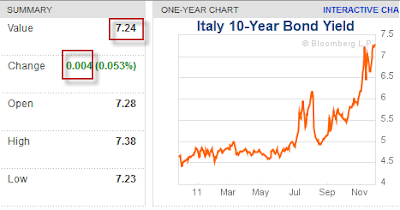 Italy 2-Year Government Bonds Italy 2-Year Government Bonds 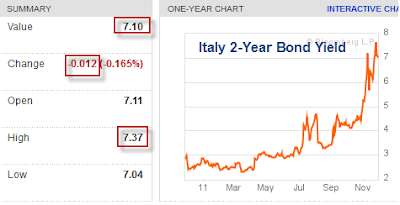 Germany 10-Year Government Bonds Germany 10-Year Government Bonds  Germany 2-Year Government Bonds Germany 2-Year Government Bonds 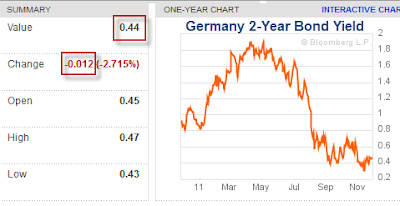 After a brief spurt higher, which sent S&P futures down a percent last evening, Italian bonds settled flat as did German bonds. In spite of the fact that Italian debt yields are above 7%, this was a "good" day. Belief in Fairy Tales Steen Jakobsen, chief economist from Saxo Bank in Copenhagen notes a huge belief in fairy tales. Steen writes via email .... There is HUGE believe in the ECOFIN meeting producing news, good news on the fiscal union. Some commentator speculate we will be in EU Heaven.
Clearly these things takes a lot longer time wise than we would like but declaring the EU either dead-or-alive by the next EU Summit on December 9th is slightly overdone. The EU process continues and the politicians clearly feel they have ample time on their hands.
EU monetary history is full of delays and Germany giving in to pressure. Merkel's position is under pressure and the Bund Yield has become our barometer for pro-EU solutions – for now the trend is clear – we are on-route to Germany giving up and soon.
[Mish Note: See Germany 10-Year Bond Chart Above]
Meanwhile in the rest of the world ... Yes there is such a thing ... The OECD report was grime reading for anyone betting the house on a good 2012. [Mish Note: See OECD Global Economic Outlook: "Muddling Through" with Slow US Growth, Europe Entering a "Minor Recession"]
Again the theme of "Perfect Storm" comes to mind. [Mish Note: Please see Perfect Storm the Most Likely Scenario; Is Europe Set to Declare a Chapter 11 in Early 2012? for a discussion.]
Still short since last FOMC – market still oversold – could be 1210/1220 on month-end manipulation, but overall low volumes and stress-indicators continuing higher creates two-way risk.
Safe travels,
Steen Italy and Spain Bond Schedule through 2021 Here are bond schedule charts from Bloomberg that highlight the difficulty for Italy and Spain for the next few years. Italian Debt Schedule 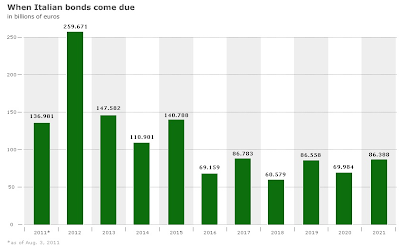 Spanish Debt Schedule Spanish Debt Schedule 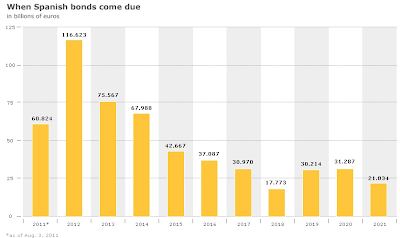 Armageddon Delayed Armageddon Delayed I picked up those charts from Pater Tenebrarum who writes Apocalypse Postponed – For Now Apocalyptic Unanimity Yesterday, we were struck by the increasing convergence of the views of various market observers as to the outcome of the ongoing crisis. It seems now widely accepted as almost a fait accompli that the euro will disintegrate within weeks. Even Jim Cramer (euro bears please take note…) is now on 'Defcon 3', predicting imminent 'financial collapse'. The Economist writes 'Unless Germany and the ECB act quickly, the single currency's collapse is looming'.
We certainly agree that Mrs. Merkel is possibly underestimating the speed and ferocity at which a market panic could crush her ambitious integration plans. We also agree that there are a number of potential events that could become the triggers for such a panic. There is considerable risk that in the case of the failure of a big bank, a wave of cascading cross-defaults could engulf the system. As noted before, Italy and Spain are unlikely to be able to refinance their debts in the markets for very long with bond yields at 7% or higher. To be more precise, they may well be able to roll over their debt at such yields, but sooner or later market access would close down due to the arithmetic of the debt spiral these high yields would inexorably produce.
Meanwhile, speculators have certainly joined the bandwagon, increasing their net short position in euro futures to yet another 17 month high, with their exposure rising another 11% last week alone.
However, if you thought it cannot get any more apocalyptic than that, Zerohedge reports that Moody's is now reviewing the ratings of 87 banks in 15 countries with a view toward downgrading their subordinated debt. When it rains, it pours.
Considering all these panicked invocations of imminent collapse one is left to wonder though, why did the DJIA rise by nearly 300 points yesterday? If we are not completely mistaken about the meaning of positioning data, then we would argue that with virtually everyone already sitting on the same side of the boat, the markets will begin to do the unexpected – which in this case means the euro should at least see some short term strength, which in turn would have affect many other markets due to the well-known and well-worn inter-market correlations that the systematic black boxes and robots trade off. The boat was too one-sided for now. However, a relief rally and a global recovery are two different things. The euro-boat is filling up with water and will eventually sink, only the timing of when and how is unknown. Mike "Mish" Shedlock http://globaleconomicanalysis.blogspot.com
Click Here To Scroll Thru My Recent Post List 

|
| Treasury Secretary Henry Paulson Tipped Off Prominent Hedge Funds Regarding Fannie Mae While Telling the US Senate and General Public a Different Story Posted: 29 Nov 2011 01:52 AM PST I have on numerous occasions made the claim that Henry Paulson is guilty of coercion and fraud. For those actions, he should be arrested and criminally tried. However, the latest disclosure in which hedge funds say they were tipped off by Paulson while he told Congress and reporters blatant lies is allegedly not even criminal behavior. Bloomberg reports Paulson Gave Hedge Funds Advance Word Treasury Secretary Henry Paulson stepped off the elevator into the Third Avenue offices of hedge fund Eton Park Capital Management LP in Manhattan. It was July 21, 2008, and market fears were mounting. Four months earlier, Bear Stearns Cos. had sold itself for just $10 a share to JPMorgan Chase & Co. (JPM)
On the morning of July 21, before the Eton Park meeting, Paulson had spoken to New York Times reporters and editors, according to his Treasury Department schedule. A Times article the next day said the Federal Reserve and the Office of the Comptroller of the Currency were inspecting Fannie and Freddie's books and cited Paulson as saying he expected their examination would give a signal of confidence to the markets.
At the Eton Park meeting, he sent a different message, according to a fund manager who attended. Over sandwiches and pasta salad, he delivered that information to a group of men capable of profiting from any disclosure.
The secretary, then 62, went on to describe a possible scenario for placing Fannie and Freddie into "conservatorship" -- a government seizure designed to allow the firms to continue operations despite heavy losses in the mortgage markets.
Stock Wipeout
Paulson explained that under this scenario, the common stock of the two government-sponsored enterprises, or GSEs, would be effectively wiped out. So too would the various classes of preferred stock, he said.
The fund manager says he was shocked that Paulson would furnish such specific information -- to his mind, leaving little doubt that the Treasury Department would carry out the plan. The managers attending the meeting were thus given a choice opportunity to trade on that information.
Law professors say that Paulson himself broke no law by disclosing what amounted to inside information.
At the time Paulson privately addressed the fund managers at Eton Park, he had given the market some positive signals -- and the GSEs' shares were rallying, with Fannie Mae's nearly doubling in four days.
William Black, associate professor of economics and law at the University of Missouri-Kansas City, can't understand why Paulson felt impelled to share the Treasury Department's plan with the fund managers.
"You just never ever do that as a government regulator -- transmit nonpublic market information to market participants," says Black, who's a former general counsel at the Federal Home Loan Bank of San Francisco. "There were no legitimate reasons for those disclosures."
The fund manager who described the meeting left after coffee and called his lawyer. The attorney's quick conclusion: Paulson's talk was material nonpublic information, and his client should immediately stop trading the shares of Washington- based Fannie and McLean, Virginia-based Freddie.
Seven weeks later, the boards of the two firms voted to go into conservatorship under the newly created Federal Housing Finance Agency. The takeover was effective Sept. 6, a Saturday, and the companies' stock prices dropped below $1 the following Monday, from $14.13 for Fannie Mae and $8.75 for Freddie Mac (FMCC) on the day of the meeting. Various classes of preferred shares lost upwards of 85 percent of their value. Who Was at the Meeting? - Mindich, a former chief strategy officer of New York- based Goldman Sachs, started Eton Park in 2004
- Daniel Stern of Reservoir Capital Group
- Singh, a former head of Goldman's proprietary-trading desk, also began his fund in 2004, in partnership with private- equity firm Texas Pacific Group Ltd.
- Frank Brosens, founder and principal of Taconic Capital Advisors LP, who worked at Goldman as an arbitrageur and who was a protege of Robert Rubin, who went on to become Treasury secretary.
- Non-Goldman Sachs alumni who attended included short seller James Chanos of Kynikos Associates Ltd., who helped uncover the Enron Corp. accounting fraud;
- GSO Capital Partners LP co-founder Bennett Goodman, who sold his firm to Blackstone Group LP (BX) in early 2008;
- Roger Altman, chairman and founder of New York investment bank Evercore Partners Inc. (EVR);
- Steven Rattner, a co-founder of private-equity firm Quadrangle Group LLC, who went on to serve as head of the U.S. government's Automotive Task Force.
Tipping Hands Brosens and Rattner both confirmed in e-mails that they had attended and said they couldn't recall details. They didn't respond when asked whether they traded in Fannie Mae- or Freddie Mac-related instruments after the meeting. Chanos declined to comment.
A Blackstone spokesman confirmed in an e-mail that GSO's Goodman attended the meeting. Blackstone doesn't believe market- sensitive information was discussed, and in any event Blackstone didn't take any positions in Fannie or Freddie between the luncheon and Sept. 6, he wrote.
Paulson often contacted Wall Street participants throughout his tenure, according to his calendar. On that July trip to New York alone, he talked to Lehman Brothers Holdings Inc. CEO Richard Fuld, Washington Mutual Inc. CEO Kerry Killinger and Citigroup senior adviser Rubin.
Morgan Stanley and BlackRock Inc. both helped the Federal Reserve and OCC prepare the reports on Fannie Mae and Freddie Mac that Paulson told the New York Times would instill confidence the morning of the Eton Park meeting.
The manager who described the Eton Park meeting says he also discussed it with an investigator from the FCIC. The discussion was confirmed by a former FCIC employee.
That manager says he ended up profiting from his Fannie Mae and Freddie Mac positions because he was already short the stocks. On his lawyer's advice, he stopped covering his short positions and rode Fannie and Freddie shares all the way to the bottom. What did PIMCO know and When? Anyone who says they do not remember a meeting like that is a liar. Anyone who says "no comment" is indeed commenting and the possible interpretation is not pretty. So what else did Paulson say? I would like to know who Paulson talked to outside the meeting. Bill Gross at PIMCO put on a huge bet, buying not equity shares but Fannie and Freddie bonds in the belief their debt would be guaranteed by the government. Gross bet the firm and won his bet as shareholders were wiped out. So, what did Gross know and when? Was it a guess, or a known deal? Sadly, there is no way to avoid questions of this nature when treasury secretaries and other high-ranking public officials have routine conversations with former colleagues giving them valuable inside information while telling blatant lies to the public. How many people were suckered into buying Fannie and Freddie while hedge funds were told in advance to dump shares? What Paulson did may not have been illegal (acting on the information would have been), which makes the comment by William Poole, a former president of the Federal Reserve Bank of St. Louis seem downright bizarre. Said Poole ... " It seems to me, you've got to cut the guy some slack, even if he tipped his hand. How do you prepare the market for the fact that policy has changed without triggering the very crisis that you're trying to avoid? What is he supposed to say without misleading these people?" On second thought, Poole's comments are not bizarre, they are 100% inane, well beyond the inane idea that the market needs to be prepared for anything, even IF there was a legal way to do it. Poole's idea of preparing the market means telling the big boys how to make billions, while screwing the little guy. Poole is another player deserving your contempt and scorn. Rolling List of High Profile Fraud Targets This list is incomplete. I have stopped updating it, it got so long. - October 10, 2010: FDIC Authorizes $1 Billion Lawsuits Against Failed-Bank Executives; Token Search for Low-Profile Scapegoats
- April 29, 2010: Barofsky Threatens Criminal Charges in AIG Coverup, Goldman Sachs Abacus Deal, TARP Insider Trading; New York Fed Implicated
- April 16, 2010: Rant of the Day: No Ethics, No Fiduciary Responsibility, No Separation of Duty; Complete Ethics Overhaul Needed
- March 2, 2010: Geithner's Illegal Money-Laundering Scheme Exposed; Harry Markopolos Says "Don't Trust Your Government"
- January 31, 2010: 77 Fraud, Money Laundering, Insider Trading, and Tax Evasion Investigations Underway Regarding TARP
- January 28, 2010: Secret Deals Involving No One; AIG Coverup Conspiracy Unravels
- January 26, 2010: Questions Geithner Cannot Escape
- January 07, 2010: Time To Indict Geithner For Securities Fraud
- October 20, 2009: Bernanke Guilty of Coercion and Market Manipulation
- July 17, 2009: Paulson Admits Coercion; Where are the Indictments?
- June 26, 2009: Bernanke Suffers From Selective Memory Loss; Paulson Calls Bank of America "Turd in the Punchbowl"
- April 24, 2009: Let the Criminal Indictments Begin: Paulson, Bernanke, Lewis
Please note that last item on the list, the first chronologically (as well as the two right above it), all involving Paulson. His actions are a disgusting tribute to the failed ethics of a man truly deserving of being spit in the face by every citizen in the country. Mike "Mish" Shedlock http://globaleconomicanalysis.blogspot.com
Click Here To Scroll Thru My Recent Post List 

|







No comments:
Post a Comment